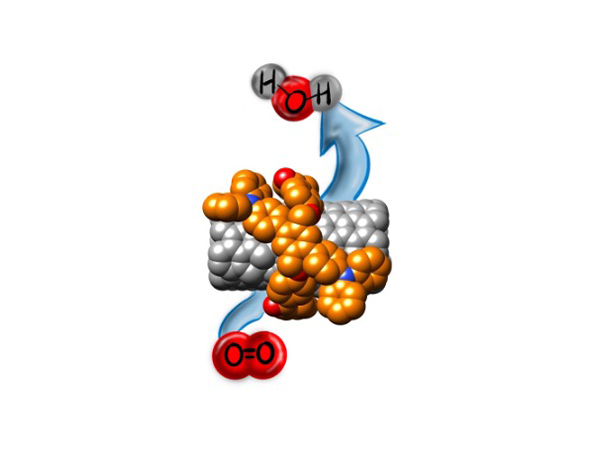On the road to obtain more sustainable energy storage systems, carbon nanotubes emerge as a green alternative to perform electrocatalytic reactions in fuel cells. By manipulating these nanostructures, scientists are improving their catalytic properties. One of the most commonly used techniques to achieve this is substitutional N-doping, embedding nitrogen atoms in carbon nanotubes. However, this approach also leads to defects in the nanostructure and prevents improvements in nanotube design.
For this reason, researchers from Centro Singular de Investigación en Química Biolóxica e Materiais Moleculares (CiQUS) and IMDEA Nanociencia have now explored an alternative strategy to substitutional doping, by encapsulating carbon nanotubes within nitrogen-rich macrocycles. This novel mechanism avoids previous defects in the nanostructure and improves the performance of the Oxygen Reduction Reaction (ORR), a key catalytic process in electrochemical devices. The group led by Emilio M. Pérez at IMDEA Nanoscience designed different nitrogen-rich cyclic molecules and synthesised mechanically interlocked carbon nanotubes (MINTs) with different functional groups. Later, the electrocatalytic study developed by María Gimenez's group at CiQUS showed that "a greater interaction between the macrocycle and the carbon nanotube improves the electrochemical charge transfer process, as well as the activity and stability, and the role of the different functional groups in the performance," explains the CiQUS Principal Investigator.
The interdisciplinary collaboration between groups has been key to carry out this work, recently published in Chemical Science. A better understanding of the electrocatalytic performance of carbon nanotubes at the molecular level directly enables the design of more active and more stable catalysts, according to the authors.
Reference
W. Zhang, M. Guillén-Soler, S. Moreno-Da Silva, A. López-Moreno, M. L. Ruiz-González, M. Giménez and E. M. Perez, Chem. Sci., 2022, DOI: 10.1039/D2SC02346F

Mechanical Interlocking of SWNTs with N-rich Macrocycles for Efficient ORR Electrocatalysis | Royal Society of Chemistry


